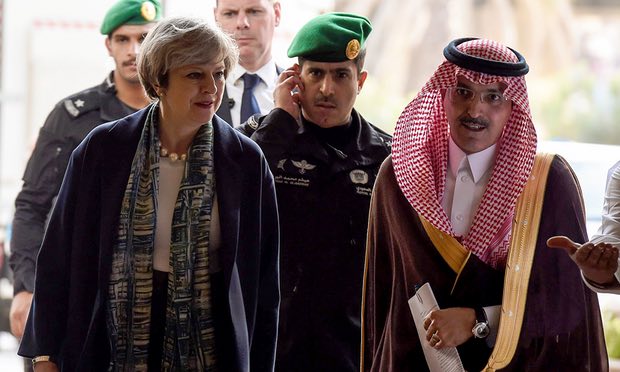5 April 2017 – UK Prime Minister Theresa May arrived in Saudi Arabia yesterday to begin a two-day visit to discuss security, trade, and investment with the Saudi regime. As this visit approached, Prime Minister May repeatedly sidestepped questions about human rights and largely demurred when prompted with questions over whether such concerns would be addressed in her meetings with Saudi leaders. Americans for Democracy & Human Rights in Bahrain (ADHRB) and the Bahrain Institute for Rights and Democracy (BIRD) are deeply concerned about the UK’s decision to omit human rights concerns from these discussions, and we call on the UK government to place its international human rights obligations at the center of its relationship with Saudi Arabia and the Gulf region more broadly.
The UK is a close ally of Saudi Arabia and provides material and diplomatic support to the kingdom despite its poor human rights record, particularly in Yemen. Since Saudi Arabia began its military involvement in the Yemen conflict in March 2015, the UK has provided more than £3 billion of arms to Saudi Arabia, including 69 Tornado fighter jets. The UK has continued this support for Saudi despite credible allegations of war crimes in Yemen. As of January 2017, the UK Ministry of Defence “tracked” more than 250 potential coalition violations of international humanitarian law. Since 26 March 2015, the violence, including the Saudi-led airstrikes, has killed at least 4,773 civilians and injured another 8,272. In February 2017 alone, coalition airstrikes have killed 106 civilians.
The UK has provided Saudi Arabia with diplomatic support. Leaked Saudi diplomatic cables show that the UK government initiated dealings to establish a vote-trading agreement that led to Saudi Arabia’s re-election in September 2015 to the Human Rights Council, despite the kingdom’s human rights record. One year later, at the 33rd session of the HRC, the UK blocked European Union efforts to establish an independent international inquiry into allegations of war crimes in Yemen. More recently, the UK has used the reports Saudi Arabia’s investigative team—the Joint Incidents Assessment Team (JIAT)—to continue to sell arms even as human rights groups have criticized the JIAT for failing to adequately investigate the numerous allegations.
“By seeking to establish stronger trade relationships with Saudi Arabia while disregarding the kingdom’s deeply troubling human rights record and culpability in credible allegations of war crimes in Yemen, the UK is doing a disservice to the Saudi and Yemeni people and to the international community more broadly,” said Husain Abdulla, Executive Director of ADHRB “If the UK is going to continue to present itself as a protector of human rights on the international stage, it needs to support its talk with action.”
The Prime Minister’s move to strengthen ties with Saudi Arabia without concern for progress on human rights illustrates the UK’s current approach to relations with the entire Gulf Cooperation Council (GCC). The UK’s International Trade Secretary Liam Fox embarked upon a “whistle-stop tour of authoritarian regimes,” over the past six months, including stops in Bahrain, UAE, Kuwait, and Oman. In his travels, Fox did not mention these countries’ deeply troubling human rights records. In November 2016, it was revealed that a UK-owned business in Northern Ireland contracted to promote human rights in Bahrain had trained Bahraini security forces that use torture to secure coerced confessions. In December 2016, both Theresa May and Foreign Secretary Boris Johnson visited the region, and each praised UK-GCC relations while failing to mention serious human rights concerns. Currently, a delegation of UK MPs is visiting the UAE in a bid to strengthen bilateral relations. This visit comes just over two weeks after the UAE government arbitrarily arrested prominent human rights defender Ahmed Mansoor
“It is extremely concerning for the UK’s post-Brexit foreign policy that Prime Minister May’s first international trip after triggering Article 50 includes a stop in Saudi Arabia,” said Sayed Ahmed Alwadaei, Advocacy Director for BIRD. “If she cares about human rights, then she should not only conduct her meetings based on business or arms sale. Nothing of what she said is of any value without taking steps to meet with civil society.”
The UK’s current close relationship with countries in the GCC serves to decrease the pressure on Gulf countries to engage in meaningful human rights reforms. Prime Minister Theresa May’s current visit to Saudi Arabia, in particular, suggests that the UK has decided to make human rights concerns subservient to trade interests and arms transfer agreements. The UK’s failure to place human rights and international law at the core of talks with the Saudi government denigrates the status of these principles. ADHRB and BIRD therefore call on the Government of the United Kingdom to ensure that human rights are at the center of its foreign policy in the GCC and around the world. We call on the UK to immediately suspend its arms sales to Saudi Arabia and to take all necessary steps to ensure that an independent investigation into war crimes in Yemen is conducted.





